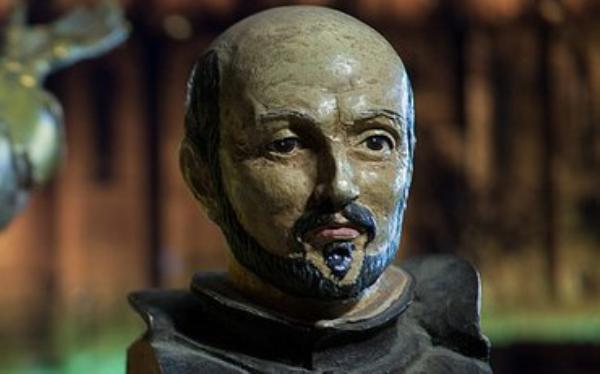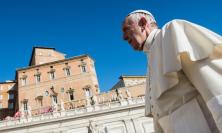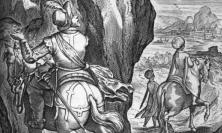The election earlier this year of the first Jesuit pope came as something of a surprise to Catholics the world over, not least to members of the Society of Jesus and other Ignatian orders! On 31 July, the Feast of St Ignatius of Loyola, we think about how the founder of the Jesuits might have reacted to the election of Pope Francis. We asked Philip Endean SJ, Nicholas King SJ, Thomas McCoog SJ and Gemma Simmonds CJ: what would Ignatius make of a Jesuit pope?
Click on an author’s name below, or scroll down to read each reflection. Gemma Simmonds CJ Thomas M. McCoog SJ Nicholas King SJ Philip Endean SJ
The gift of self for God’s service
Gemma Simmonds CJ
In a Thinking Faith article written just before the election of Pope Francis, I suggested it was time we had a pope who was a member of a religious order. Gratified that the Holy Spirit appeared to be of the same opinion, I received numerous messages after the papal election congratulating me on my prescience and asking if I was any good at predicting lottery numbers. But while delighted at the election I admit I was as surprised as anyone that the religious order in question should be the Society of Jesus. Jesuit Constitution §817 warns against ‘ambition, the mother of all evils’, forbidding Jesuits from seeking office in the Church and allowing them to accept it only by command ‘under pain of sin’. So would Ignatius himself have been glad to see a Jesuit pope? I find my answer in the Spiritual Exercises.
In the Exercises Ignatius outlines an equation that, for him, lies at the root of the disordered appetites against which he sees the Exercises as operating. First comes wealth, the power that comes with possession and the way we identify value with what we possess. From this comes honour, the kudos of this world which accrues from being in the possessing class, and from this stem pride and vainglory. For Ignatius, this was the besetting trajectory of sin and for this reason he warned against Jesuits becoming entrenched in positions of power. But he may also have had another reason for the ban. The so-called Fourth Vow, of universal mission under the direction of the pope, was in fact the first vow that the founding Jesuits took, by which they identified their vocation principally as a missionary one. This sat ill with the permanent commitment to one place that comes with being a local bishop. It is this principle of flexibility and mobility that may also have driven the prohibition against accepting episcopal sees.
But the Principle and Foundation (SpExx.23) also makes clear that for a person who wishes to be truly free to love and serve God, there are no criteria that are inherently canonised: neither wealth nor poverty, health nor sickness, long life nor short. The only guiding criterion is the gift of self for God’s service, in which lies our deepest freedom. This is the root of true poverty and humility. According to this, and to the sentiments behind the Suscipe at the end of the Exercises, if God has gifted us with the capacity and skills for leadership, then our best choice is to dedicate ourselves to it for God’s greater glory.
In this respect a Jesuit pope, if the Holy Spirit has inspired the conclave to elect one, makes as much sense as a Jesuit worker priest or medical orderly, professor of theology or parish priest. What matters is the way in which he carries out his office. So far we have seen Pope Francis enacting a servant style of leadership and laying particular emphasis on the service of the poor. He has done this in the spirit of the Exercises. Ignatius could only approve.
Gemma Simmonds CJ is Director of the Religious Life Institute and a lecturer in Pastoral Theology at Heythrop College, University of London.
What Would Ignatius Do?
Thomas McCoog SJ
In the 1990s, evangelical Christians in the United States popularised the question, ‘What Would Jesus Do?’ to remind themselves of perennial Christian moral demands. Each serious disciple should ponder how Jesus would have acted in any situation and do likewise. The abbreviation WWJD proliferated, appearing on bracelets, mugs, pens and tattoos. The election of Pope Francis might have prompted Jesuits and others to ask, ‘What Would Ignatius Do?’ in the face of an unprecedented Jesuit pope. How would Ignatius Loyola have reacted to the news?
Ignatius deemed the exclusion of any ambition – ‘the mother of all evils in any community or congregation whatsoever’ – essential for the preservation and growth of the Society of Jesus. Thus he closed the door ‘against seeking, directly or indirectly, any dignity or prelacy within the Society in such a way that all the professed should promise to God our Lord never to seek one and to expose anyone whom they observe trying to obtain one ...’. Jesuits were told they could aspire to the offices of novice master and minister because both demanded service and offered little prestige. No professed Jesuit should consent to an ecclesiastical appointment unless ‘compelled by an order from him who can command them under pain of sin’.[1] Moreover should a Jesuit be thus compelled, ‘he will at any time whatsoever later on listen to the counsel’ of either the general or someone nominated by the general. But he need not follow the advice. Because critics castigated Ignatius for feigning humility, he vowed against the acceptance of any dignity unless commanded to do so directly by the pope.
William V. Bangert SJ commented on the ‘real danger . . . that the Society of Jesus would disappear from the face of the earth by being absorbed into the hierarchy of the Church’[2]: King João III of Portugal wanted to name Simão Rodrigues Bishop of Coimbra in 1543, and Pierre Favre Patriarch of Ethiopia in 1546; Ferdinand I, King of the Romans, wanted Diego Laínez for the bishopric of Laibach (now Ljubljana) in 1545, and Nicolás Bobadilla for the bishopric of Trieste in 1546. Around the same time, Paschase Broët was considered for episcopal office. After Bobadilla’s refusal, Ferdinand pressed for Claude Jay. Ignatius marshalled his theological arguments and canvassed his influential friends as he presented his case against the appointment to Pope Paul III, the pontiff who had approved the Society of Jesus six years earlier. In 1547 Ferdinand capitulated; Ignatius won what Jerónimo Nadal characterised as, ‘the episcopal ordeal.’ But was the victory permanent?
Employing the same means, Ignatius argued against subsequent attempts by Pope Julius III to create Francis Borja a cardinal in 1551; Ferdinand’s nomination of Peter Canisius as Bishop of Vienna in 1553; and Pope Paul IV’s bestowal of a red hat on Diego Laínez in 1555. In the lifetime of Ignatius, five of his original companions and two early and important recruits were considered for ecclesiastical honours. He successfully safeguarded them and the new Society. No Jesuit received the cardinatial red hat until the nomination of Francisco de Toledo in 1593. Forty-three Jesuits have been named cardinals, sixteen of whom were appointed by Pope John Paul II and Pope Benedict XVI.
Ignatius did make one exception: he agreed to the episcopal ordination of João Nunes Barreto, Andrés de Oviedo and Melchor Carneiro for a Portuguese-sponsored mission to Ethiopia, the land of the fabled Prester John. Because the mission promised hardship and ordeal without honour and benefice, Loyola did not consider it a violation of the Society’s injunction against ambition. Of the three, only Oviedo travelled to Ethiopia where, in 1577, he died in destitution. Now, too, Jesuit bishops proliferate and not just in the traditional ‘mission’ lands. The most recent, Michael C. Barber SJ, was ordained Bishop of Oakland (California) in May 2013.
So what would Ignatius do? Of course the ecclesiastical world has changed. Cardinals, generally, no longer dress as Renaissance princes. Post-Tridentine theology considers bishops as vigilant shepherds of their flock and not as privileged lords. Continually in the spotlight because of the many problems facing the Church and under investigation by honest critics and curious journalists, the papacy – and episcopal office in general – holds fewer attractions than formerly. No pope today would echo Pope Leo X’s alleged comment: ‘Since God has given us the papacy, let us enjoy it.’ Moreover, within the sealed papal conclave, Ignatius would not have been able to counter any campaign for a Jesuit pope. How would he have reacted to the election? Luis Gonçalves da Câmara SJ recounted a conversation between Ignatius and his doctor:
Once when the doctor had told him he should avoid any bout of melancholy, because that would harm him, the Father said afterwards, ‘I have considered what might cause me melancholy, and I have not found anything, except if the Pope were completely to undo the Society: and even this, I think, if I were to recollect myself in prayer for a quarter of an hour, I would be as happy as before, and even more so’.[3]
Da Câmara cited Ignatius’s reaction to the election of Gian Pietro Cardinal Carafa as Pope Paul IV as an illustration: the initial news shocked him but after some recollection, he looked for and discovered the pope’s good qualities. The election of Pope Francis might have shocked Ignatius, but what would he have done subsequently? Most likely he would be applauding and proclaiming, ‘well done, good and faithful servant.’
Thomas M. McCoog SJ is the archivist of the British Province of the Society of Jesus.
The effects of the Exercises
Nicholas King SJ
On the face of it, it seems as if Ignatius would be uncomfortable with a Jesuit pope. Because bishoprics were, in Ignatius’s day, a way into wealth and power, he was very keen to avoid anything that would damage the integrity of the young group of talented and pious priests that were his initial companions. So in the Constitutions of the Society of Jesus, the newly-incorporated Jesuit vows not to seek to become a bishop or cardinal; and Ignatius worked very hard indeed to make sure that Francis Borja, the erstwhile Duke of Gandía, should not be made a cardinal when there was pressure in Rome to have him elevated to the purple.
This reserve about prelacies springs from the insights given to Ignatius in the religious journey that he made, which he eventually succeeded in outlining on paper in the Spiritual Exercises. The retreatant ends the first exercise of the First Week gazing at Christ on the Cross, and asking, ‘What have I done for Christ; what am I doing for Christ; what ought I to do for Christ?’ Then, before the Second Week gets underway, the retreatant is invited to respond to Christ’s invitation in the ‘Call of the King’ with the cheerful embracing of any kind of suffering, in imitation of Christ the Unusual King. This goes deeper as we are invited to make a choice about the state of life to which God is calling us and, in the meditation on the ‘Two Standards’ (or ‘Flags’), to see how the Tempter invites us to get trapped in riches and honour and pride, whereas the Lord invites us to the freedom of poverty, insults and contempt. When we have arrived at our decision, Ignatius gets us to pray through the Third Week, to ask for ‘grief, deep feeling and confusion’ as we contemplate Christ in his suffering, as a reality check. So the glamour of episcopacy does not easily fit into this austere vision of Christian discipleship and Jesuits have, for the most part, thought it proper to resist the allure of prelacies.
On the other hand, there have in the past been Jesuit bishops and cardinals, and this was the case even in Ignatius’s day. In our day, of course, the very last people who should be raised to the hierarchy are those who are seeking such promotion. It must also be said that today they are unlikely to achieve either wealth or power by these means. So it seems appropriate that Jesuits whom the pope asks to sacrifice themselves by taking on such a task should at least be open to the idea. And there is a little more to this: one of the effects of the Exercises is that the retreatant arrives at a certain freedom in her or his dialogue with God. So the rigid insistence that under no circumstances should a Jesuit accept to be made an archbishop, for example, may be lacking in precisely that freedom. If we then look a little further and examine what is going on in this present case, where we have a Bishop of Rome whose manner of exercising his ministry clearly reveals the effects that the Spiritual Exercises, made twice in his life, have had upon him, then it is churlish to argue that he should never have accepted the job. If this is what the Lord is calling him to, then that is what he must do; and the signs so far are that this Jesuit pope has been an extraordinary and grace-filled gift to the Church, just what we need at this critical moment.
Nicholas King SJ is a tutor in Biblical Studies at Campion Hall, University of Oxford.
The wrong question
Philip Endean SJ
A few years ago, I happened to meet a senior official of the Roman Curia. When he heard I was a Jesuit he asked me if I agreed that St Ignatius would not recognise himself in the Jesuits of today. Given that the man himself was a religious, what I wanted to say in reply was, ‘about as little as your founder would recognise himself in you’. But considerations of diplomacy, and my lack of decent Italian, led me to confine myself to ‘no’. The prelate complimented me, probably backhandedly, for making my own position clear, and the conversation ended in tight-lipped seemliness.
The irony was that this prelate had picked not on just any old Jesuit, but on one who had, among his youthful indiscretions, written an article on how the memory of Ignatius functions in Jesuit piety. Like many religious polemicists, I had lumped together the pieties I was criticising under the name of a heresy I invented for the purpose: Jesuit fundamentalism. A generation later, the article strikes me as a bit wordy and overstated, but nevertheless I still stand by its major claim. When we talk about what St Ignatius (or any other major figure from the religious past) would do today, the claims we make—particularly if they are contentious—are being driven at least as much by our own judgements now, sensible or stupid, as by anything in the historical record. If we answer directly the question, ‘what would Ignatius make of a Jesuit pope?’, what we are really doing is saying what we think about a Jesuit pope. At the risk of churlishness, I suggest that we recognise that simple reality.
Historical study helps us primarily by showing us how different the past is. We have no record of Ignatius thinking about a Jesuit becoming pope. In one important sense, it would have been impossible. Ignatius imagined the Society of Jesus as a group of apostles, being sent by Jesus to preach in poverty. Being sent: however creative and imaginative the work of the early Jesuits was, they understood it as responding to an initiative that was not their own, an initiative that came from God. Since Jesus had ascended to heaven—Ignatius had looked wistfully at his footprint—the source of such an initiative would have to be his substitute or vicar, namely the pope. The way Ignatius imagined his vocation thus depended on the pope being an external authority, someone who could mediate what properly could only come ‘from above—de arriba’, someone precisely not a Jesuit.
The world in which such a vision made sense was that of early modernity. A medieval Christendom was becoming newly aware of realities beyond its boundaries, both geographical and cultural. Ignatius’s movement was founded on a sense that God was to be found in these new spaces. The word of God could be preached in poverty, discovered outside the inherited structures. To be a bishop in the late Middle Ages was normally not to be a pastor, but the possessor of a benefice, a source of income. The office connoted stability, involving political and financial entanglements, rather than anything that moderns would recognise as preaching or pastoral care. While respecting the tradition he inherited, Ignatius sought to serve the world beyond. He was precisely not part of a local communion, but missioned by the pope as universal pastor.
For a Jesuit actually to become a bishop—at least outside the exceptional circumstances of the mission to Ethiopia—represented for Ignatius a denial of what was most central to his vocational self-image. He put the matter like this: ‘to take any dignity would be for us to ruin the Society, so much so that if I wanted to imagine or think up ways of wrecking and destroying this Society, this way, the acceptance of a bishopric, would be one of the main ones, or even the most important of all’ (Letter 149: Ignatius to Ferdinand, King of the Romans, 1546).
The assumptions of early modernity, within which Ignatius’s aversion to ecclesiastical dignities makes sense, passed a long time ago. When Francis Xavier wrote back to Europe from the East, his tales of Indians being baptised were exotic and sensational. In general, European Christians had no daily lived experience of the religiously other, and the Jesuits’ newness and distinctiveness matched precisely this novelty. Today, things are different. To be religious at all involves an element of choice; any particular commitment is always accompanied by a sense that indefinitely many alternatives are socially possible. In a Church that cannot exist except in mission, in interchange with the world beyond itself, the virtues and values promoted by Ignatius are necessarily central: disinterested integrity, ministry of the word, the fostering of holy relationship. It is anachronistic to think that there is some necessary tension between Ignatian values and the pastoral office, however much the accidents of recent Church politics might promote the idea.
‘What would Ignatius make of a Jesuit pope?’ is a silly question—we have one whether we like it or not. Both papacy and episcopacy now have significances which the historical Ignatius could not have imagined. The simple fact that a Jesuit has been made pope should highlight the fact that we have moved beyond the world in which Ignatius issued his prophetic challenges to established Christendom. If we are to use the Ignatian tradition fruitfully today, we need to let go of what Ignatius actually said, and focus more on the kind of issue he was trying to address. What in the set-up of the present Church prevents it from answering the needs of God’s people today? What new forms of Christian life and ministry can point us beyond these limitations? Those questions, which go well beyond issues about Jesuits being bishops or popes, are eminently worth asking. Moreover, in a loose sense, they are recognisably Ignatian questions. We can only be grateful that the first gestures of Pope Francis’ pontificate seem at last to have put some questions on the public agenda of the Church.
Philip Endean SJ is a Fellow in Theology at Campion Hall. University of Oxford, and is about to move to the Centre Sèvres, the Jesuit faculty in Paris.
[1] The Constitutions of the Society of Jesus, trans. George E. Ganss SJ (St. Louis, 1970), p. 334 (§817).
[2] Claude Jay and Alfonso Salmerón (Chicago, 1985), p. 91.
[3] Remembering Iñigo. Glimpses of the Life of Saint Ignatius of Loyola (St. Louis, 2004), p. 110, num. 182.
More for the Feast of St Ignatius on Thinking Faith:
‘Will the Real Ignatius Please Stand Up?’ by Ron Darwen SJ on Thinking Faith ‘Call and response in St Ignatius and St Francis’ by Brian Purfield on Thinking Faith ‘Ignatius of Loyola: Theology as a way of living’ by James Hanvey SJ on Thinking Faith ‘Ignatius in Lutheran light’ by Philip Endean SJ on Thinking Faith ‘My Own Personal Ignatius’ on Thinking Faith






